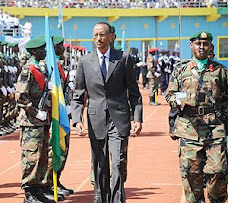Par Joseph Badibanga, Libreville Gabon

Pour ceux qui ont appris l'histoire de l'esclavage, vous connaissez certainement la différence entre « les esclaves de champs » et « les esclaves d'intérieur, ou plus exactement les nègres d'intérieur ». Contrairement aux premiers, les nègres d'intérieur étaient choisis par leur maître suivant plusieurs critères, dont la docilité, l'obéissance aveugle, le manque de courage, de dignité, et la spontanéité à trahir.
Ces nègres d'intérieur adoraient leur maître comme un Dieu, et le maître feignait de les qualifier d' « intelligents» et plus « doués » que leurs frères nègres de champs qui refusaient la soumission. Cette histoire malheureuse est encore d'actualité dans certains pays africains et plus affreusement au Rwanda. Dans ces pays qui participent atrocement à l'asservissement et l'humiliation de l'homme noir, la démocratie est bannie, les droits de l'homme sont piétinés, le pillage des ressources est la règle.
Le « meilleur » des nègres d'intérieur est désigné par les maîtres comme Président, « notre ami le président ». Le nègre « élu » reçoit la mission de faire passer leurs intérêts avant ceux du peuple, quoiqu'il en coûte en vies humaines des nègres. Après l'« abolition de l'esclavage » suivi des indépendances africaines, ces nègres d'intérieur sont devenus entre autres Présidents de la République. Ce sont des espèces qui s'auto-reproduisent facilement et se répandent sur le continent africain. Récemment on a pu les localiser dans certains pays comme le Rwanda, le Cameroun, le Gabon, le Congo, le Togo, etc.
 Ces dernières années, le nègre de maison le plus en vue est le général Paul Kagame. Il rapporte gros à son maître, contrairement aux autres nègres qui sont de moins en moins « productifs ». Le nègre de maison Kagame « dirige » le Rwanda depuis 26 ans et va rester jusqu'en 2032. D'ici là, son maître jugera, au mépris du peuple rwandais, si ce « nègre de maison »préserve toujours ses intérêts. Le cas Kagame est instructif à plus d'un titre. Cet ex-réfugié tutsi rwandais qui est arrivé au pouvoir après un bain de sang sans précédent dans l'histoire du Rwanda. Soutenu par l'occident, il a éliminé tous ses concurrents plus instruits et visionnaires.
Ces dernières années, le nègre de maison le plus en vue est le général Paul Kagame. Il rapporte gros à son maître, contrairement aux autres nègres qui sont de moins en moins « productifs ». Le nègre de maison Kagame « dirige » le Rwanda depuis 26 ans et va rester jusqu'en 2032. D'ici là, son maître jugera, au mépris du peuple rwandais, si ce « nègre de maison »préserve toujours ses intérêts. Le cas Kagame est instructif à plus d'un titre. Cet ex-réfugié tutsi rwandais qui est arrivé au pouvoir après un bain de sang sans précédent dans l'histoire du Rwanda. Soutenu par l'occident, il a éliminé tous ses concurrents plus instruits et visionnaires.
Grâce à son éducation informelle et sa formation incomplète (trois ans post primaire), il est considéré comme le plus « intelligent » ou plus malin, capable de sacrifier les siens pour des honneurs inespérés. Dans son pays, le nègre de maison Paul Kagamé n'a aucun opposant politique actif, parce que son maître n'en veut pas ! Ceux qui ont eu la chance, se sont exilés, les autres ont été exécutés avec l'aval discret du maître. Ce qui m'étonne, ce sont les nègres des champs rwandais, qui pensent que Kagamé doit être jugé par qui et pourquoi ? La réponse est dans la question.
Kagame est en mission. Le maître a besoin d'autres « Kagamés » dans d'autres pays africains. Il a été choisi pour détruire toute initiative qui valoriserait le nègre. Il doit saboter toute action qui sonnerait la fin de la domination et l'exploitation de l'homme noir. Nous assistons à des spectacles désolants où le nègre de maison Kagamé détruit insidieusement le Burundi et le Congo, afin de les offrir à son maître. Il va y arriver si les « nègres » burundais et congolais restent passifs. Quoiqu'en pensent d'aucuns, en règle général, l'occident est prompt à s'attaquer à tout dirigeant africain qui bafoue la démocratie et les droits de l'homme, sauf s'il est nègre de maison..
Ainsi on comprend aisément le silence assourdissant du maître sur les crimes commis par le nègre de maison Kagamé. En fait, Kagame n'est pas le criminel, il est le bourreau exécuteur de l'ordre du maître. Cher ami, tant que tu seras nègre de maison, tu auras tous les avantages du Maître. Par conséquent, tu seras exonéré des exactions commises à l'endroit de tes frères noirs.. Tant que tu seras nègre de champs, quoique tu fasses le maître te saliras, te puniras, te tueras par le nègre de maison.
Toi frère noir, nègre de champs, si tu aspires à changer ta condition, révolte-toi, comme ses esclaves du Mississippi. Chasse à grand renfort et définitivement ce nègre de maison sans oublier son maître. Celui-ci doit comprendre qu'après 5 siècles de domination, tu es enfin maître de ton destin.
Par Joseph Badibanga, Libreville Gabon
Posted by: Alfred Nganzo <alfrednganzo@yahoo.com>
| Reply via web post | • | Reply to sender | • | Reply to group | • | Start a New Topic | • | Messages in this topic (1) |
-The hate of men will pass, and dictators die, and the power they took from the people will return to the people. And so long as men die, liberty will never perish.
-I have loved justice and hated iniquity: therefore I die in exile.
-The price good men pay for indifference to public affairs is to be ruled by evil men.
-When the white man came we had the land and they had the bibles; now they have the land and we have the bibles.
----------------------------------------------------------------------------------------------------------
The Voice of the Poor, the Weak and Powerless.
-----------------------------------------------------------
Post message: africaforum@yahoogroups.com
Subscribe: africaforum-subscribe@yahoogroups.com
Unsubscribe: africaforum-unsubscribe@yahoogroups.com
List owner: africaforum-owner@yahoogroups.com
__________________________________________________________________
Please consider the environment before printing this email or any attachments.
------------------------------------------------------------------------------------------------------------








